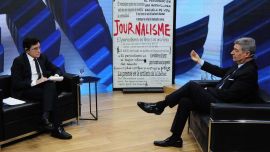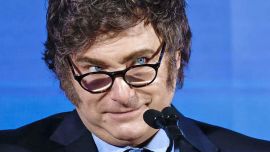A row over press freedom erupted this week after Santiago O’Donnell, the author of the best-selling book Hermano, was ordered to turn 17 hours of recordings of his interviews with Mariano Macri, the brother of former president Mauricio Macri.
In a controversial pre-trial civil court decision, Judge Susana Margarita Gastaldi ordered the journalist to turn over the tapes in response to a lawsuit filed by Mariano Macri, who granted interviews to O’Donnell prior to the book’s publication.
Hermano, published in October 2020, discusses Mariano’s life and his relationships with his wider family, paying particular attention to his older brother.
O’Donnell describes the ruling as “unusual” and claims the decision violates the constitutional principle of freedom of expression. He went public with the news this week in order to draw attention to its potential impact on press freedom.
“There is no jurisprudence behind this decision. It goes against all sorts of jurisprudence of the city, of the country and of the international treaties that Argentina adheres to,” O’Donnell told the Times in an interview.
The decision was made as a “pre-trial” motion, which according to civil court procedure, cannot be appealed, O’Donnell explained. He argued that his inability to appeal the ruling was unconstitutional.
“Argentina is obliged, because its constitution adheres to international treaties, to say every person has a right to an appeal,” he said
“Nobody has ever used a pre-trial motion to deliver a decision as heavy and as decisive as telling a journalist to hand over his working tools,” the journalist argued.
Having no path to appeal in line with the civil code, O’Donnell said his lawyer advised him that the only real way to fight the ruling was to go public.
As well as being ordered to hand over the tapes by February 9, O’Donnell had been told he will face a daily fine if he refuses to comply.
Support from peers
News of the resolution prompted anger among fellow journalists, both inside and outside Argentina, with many describing it as an unprecedented attack on freedom of expression.
Support has come from diverse groups such as the Association of Argentine Journalistic Entities (ADEPA), as well as international organisations including Reporters without Borders and the Association of Foreign Correspondents. In addition, the story was shared via twitter by the international news leak organisation, WikiLeaks, on Friday.
FOPEA, a local press watchdog, said the judge's decision "puts at risk the constitutional guarantee of protection of secrecy of sources."
“There has been an outpouring of support from all sorts of journalists and all sorts of media – from the press union, academia, universities and from individual reporters who would normally never sit at a table together,” O’Donnell told the Times.
Still, it remains unclear how this case will proceed. This week O’Donnell presented his case to the Special Rapporteur of Freedom of Expression of the Inter American Commission for Human Rights.
He anticipates that the Commission will open an investigation into the case and “make a strong ruling against this judicial decision.”
“I took it to the Inter-America Commissioner because this is a matter of freedom of expression and it can have a very negative impact on the entire region,” he explained.
While these events have all unfolded just over the past week, they are a product of many attempts by the Macri family to challenge the book since its inception, the journalist claimed.
The legal challenges to the book have “been going since December and I was never notified about it” before the ruling, O’Donnell said. “The judge chose to keep this attempt secret, and other attempts include trying to keep the book from coming out.”
The lawsuit against the book was attempted twice before, with the court ruling against the adjunction, and an appeal court confirming that decision.
“I found out I was being sued on the same day that the judge had already ruled against me,” he said.
The author is unsure why Mariano is “obsessed with the tapes,” but said he believes that the book “really set off” Mauricio Macri, implying that the former president may be the one behind the suit.
O’Donnell, who began his long journalistic career at the Buenos Aires Herald in the latter years of the last century, also expressed concerns that information recorded in the tapes, which he chose not to include, would be made public, should he hand over the recordings.
Regardless of how this case plays out, the implications of this decision are clear and will be watched closely in the coming weeks.


























Comments